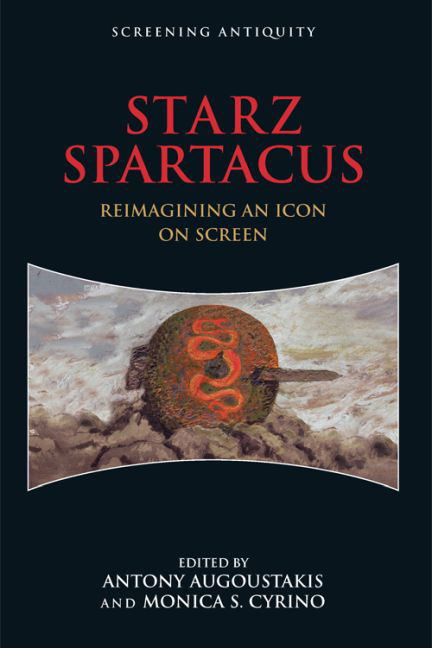Book contents
- Frontmatter
- Contents
- Series Editors' Preface
- Editors' Acknowledgments
- Contributors
- List of Illustrations
- Episode Listing
- Introduction: Reimagining a New Spartacus
- PART I HEROES AND HEROISM
- 1 Memories of Storied Heroes
- 2 From Kubrick's Political Icon to Television Sex Symbol
- 3 The Life and Death of Gannicus
- 4 A New Crassus as Roman Villain
- PART II SOCIAL SPACES
- PART III GENDER AND SEXUALITY
- PART IV SPECTACLE AND VIOLENCE
- Filmography
- Bibliography
- Index
3 - The Life and Death of Gannicus
from PART I - HEROES AND HEROISM
Published online by Cambridge University Press: 27 April 2017
- Frontmatter
- Contents
- Series Editors' Preface
- Editors' Acknowledgments
- Contributors
- List of Illustrations
- Episode Listing
- Introduction: Reimagining a New Spartacus
- PART I HEROES AND HEROISM
- 1 Memories of Storied Heroes
- 2 From Kubrick's Political Icon to Television Sex Symbol
- 3 The Life and Death of Gannicus
- 4 A New Crassus as Roman Villain
- PART II SOCIAL SPACES
- PART III GENDER AND SEXUALITY
- PART IV SPECTACLE AND VIOLENCE
- Filmography
- Bibliography
- Index
Summary
The aim of this chapter is to explore the portrayal of heroism and the hero's journey in STARZ Spartacus, particularly in the character of Gannicus. The idea of the “hero's journey,” inspired by Joseph Campbell's The Hero With a Thousand Faces (1968, 2nd ed.) and formalized into a root structure for screenplays in Charles Vogler's The Writer's Journey (1998), is a popular one among screenwriters, highlighting the need for clear character development leading to an emotionally satisfying end for the characters with whom they want their audience to identify. In a series like Spartacus, in which the majority of the lead protagonists are doomed to die in the series finale, this means thinking long and hard about the way in which each character will be killed. With the shadow of Stanley Kubrick's 1960 Spartacus looming large over the production, it is particularly interesting that creator Steven S. DeKnight and his team of writers chose not to include Spartacus among the surviving rebels crucified by Crassus, as Kubrick had, but to put their second protagonist Gannicus into that position. Drawing loosely on narratological theory and approaches to screenwriting, this chapter will explore the nature of Gannicus’ heroism in the series with a view to answering the question: why crucify Gannicus, rather than Spartacus?
HISTORY AND LEGEND
In retellings of mythology, both ancient and modern, there is a certain amount of leeway allowed to writers to play with the material, but this freedom only stretches so far. So, for example, the reason Medea's children die might change with each new version of the story, but they still have to end up dead. Even when extremely drastic alterations are made, such as Agamemnon and Menelaus both being killed at Troy in Wolfgang Petersen's 2004 film, the Greeks must still sneak into the city in a giant horse and destroy it. Works of fiction based on Roman history usually have less leeway, because more is known about the history. However, these are still fictionalized retellings, and a certain amount of artistic license is still allowed even in the face of known historical facts. For example, the writers of the HBO-BBC series Rome kept Octavian's mother Atia alive far longer than was the case historically in Season Two, because the character was popular and the writers wanted to do more with her.
- Type
- Chapter
- Information
- STARZ SpartacusReimagining an Icon on Screen, pp. 52 - 68Publisher: Edinburgh University PressPrint publication year: 2017

